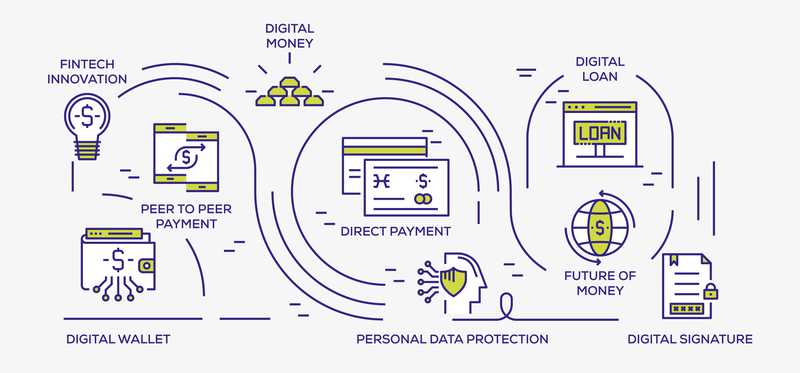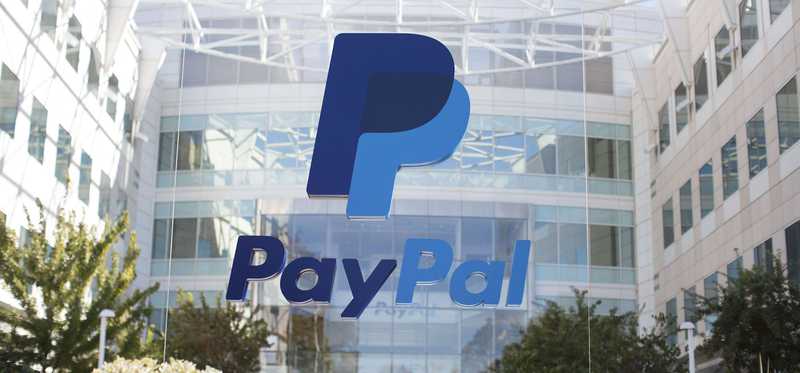The Best Fintech Stocks to Buy in 2019 and Beyond

The Best Fintech Stocks to Buy in 2019 and Beyond
What is fintech?
Fintech, short for financial technology, describes any way the financial industry can leverage technology to accomplish traditional financial tasks, generally making them cheaper, more convenient, and faster as a result. This term necessarily encompasses a wide range of tasks and products that can include anything from mobile payments and online banking to accounting software and cryptocurrencies. As fintech applications gain in popularity they are essentially democratizing financial services, making it easier than ever before for the world's unbanked and underbanked to gain access to these services.
Previous
Next

Risks to investing in fintech
Investors should be aware of three primary risks before investing in fintech. First, many fintech companies are exposed to credit liabilities, including some companies specifically trying to disrupt the lending business. During an economic downturn, many consumers might not be able to pay off debts, however, leaving these companies with a big problem. Consequently, companies with credit exposure will almost always be handed a cheaper valuation multiple by the market.
It's also hard to tell which winners will eventually win out in this still budding space. In some cases, the nimble upstart will emerge as the victor while, in others, the entrenched legacy player might pivot in time to stave off disruption.
Finally, the financial industry is one of the most regulated sectors in the developed world, with different laws and rules regulating financial institutions in nearly every country. For technology companies used to breaking things fast as they innovate, this makes for a risky maze to navigate.
Click through to read about six different options for investing in fintech.
Previous
Next

1. Fintech ETFs, the easy way to invest in fintech
Exchange-traded funds, or ETFs, are a basket of securities that trade as a single entity. ETFs are designed to track different indices and sectors, and a couple are themed to follow the fintech industry, including Global X FinTech Thematic ETF (NASDAQ:FINX) and the Ark FinTech Innovation ETF (OTC:ARKF). For investors, these ETFs come with numerous advantages, including instant diversification within the fintech industry and a vast simplification of the investing process, making it unnecessary for investors to study various individual companies.
The Global X Fintech ETF attempts to invest in companies on the leading edge of industries such as "insurance, investing, fundraising, and third-party lending through unique mobile and digital solutions." Global X Fintech's top holdings include payment processing companies such as Fiserv Inc (NASDAQ:FISV) and Fidelity National Information Services (NYSE:FIS), and Intuit (NASDAQ:INTU), the company behind QuickBooks and TurboTax.
The ArkFinTech Innovation ETF invests at least 80% of its assets in companies that engage in financial technology innovation. The fund determines that a company meets this standard if "(i) it derives a significant portion of its revenue or market value from the theme of Fintech innovation, or (ii) it has stated its primary business to be in products and services focused on the theme of Fintech innovation." The top three holdings of the fund are currently Square (NYSE:SQ), Apple (NASDAQ:AAPL), and Tencent Holdings (OTC:TCEHY).
Previous
Next

2. Alibaba Group Holding (NYSE:BABA)
Alibaba, the Chinese e-commerce giant, makes this list because of its large stake in Ant Financial, the company behind Alipay, the mobile digital wallet platform with more than 1 billion active users across the globe. Ant Financial, however, provides far more financial services than just Alipay. The company also offers additional financial services, such as automated asset management advice and credit to Chinese consumers, boasting that it only takes three minutes to apply and one second to get approved and receive funds. Incredibly, approximately 640 million consumers subscribe to at least two of its services worldwide.
One of the most attractive aspects of Alibaba for fintech investors is that Ant Financial has transformed itself into the world's largest fintech venture capital fund. In 2018, the company invested $14 billion in fintech unicorns, private start-ups valued at more than $1 billion each. Many of the invested funds were aimed at companies in Southeast Asia, where cash is still primarily used for purchases, giving these companies long runways of growth.
Previous
Next

3. BlackLine (NASDAQ:BL)
BlackLine offers cloud-based, accounting software to its enterprise clients, automating complex and tedious accounting tasks that previously required intense labor to complete. The company's software also gives its clients access to real-time data that was traditionally only available after monthly or quarterly reconciliations. In its second quarter, revenue rose to $69.7 million, a 26% increase year over year, with an adjusted gross margin of 82.7%. BlackLine also added 106 new customers to its roster, good for a 17.1% increase year over year.
Yet the true measure of BlackLine's success is its customers' willingness to spend more on the platform every single year. In Q2, the company's net revenue retention rate was 108%, essentially meaning that the company's existing customers from the year before spent an additional 8% this year than they did last year. BlackLine customers virtually never leave, with the company boasting a 98% customer retention rate among its largest enterprise clients.
Previous
Next

4. Global Payments (NYSE:GPN)
Global Payments provides payment processing services to commercial customers, enabling them to accept card and digital payments at the point-of-sale and online. Earlier this year, the company announced a huge merger with Total System Services (NYSE:TSS), agreeing to acquire it for $21.5 billion. Management projects the deal to result in cost savings of $300 million and $100 million in revenue synergies annually. The combined company will be a payments powerhouse, facilitating about $50 billion of transactions annually and featuring a customer base of 3.5 million merchants and 1,300 financial institutions.
The best reason to invest in Global Payments might be its track record of making, smart tuck-in acquisitions that embed its payment processing services into niche software verticals. For instance, in 2017, Global Payments acquired ACTIVE Network for about $1 billion. ACTIVE Network provides event planning software to organizations like youth camps and sports leagues, with an impressive list of customers including several state park departments and the YMCA.
As Global Payments embeds its payment services into ACTIVE Network's software, it becomes much more than a commoditized payment processing provider, making it very costly for customers to switch to a competitor. If they were to do so, they would not only need to switch payment processors, but also find entirely new event planning software. Global Payments has smartly copied this strategy across several industries through acquisitions like ACTIVE Network and partnerships.
ALSO READ: The Secret to Global Payments' Success
Previous
Next

5. Mastercard (NYSE:MA)
Mastercard is the giant payments network that facilitated almost 21.5 billion transactions in its 2019 second quarter through the use of its 2.55 billion cards currently in circulation. For acting as the toll road for your money, providing the means for your funds to travel from your bank account to the merchant's bank account every time one of its cards is used, Mastercard collects a tiny fraction of the payment volume. By participating in this huge volume of transactions, without exposing itself to any credit risk, Mastercard can maintain a high operating margin -- 58.3% in its most recent quarter.
What makes Mastercard so special is how much it's willing to invest back into its business, developing tools and services for financial institutions to use for such things such as data analytics, fraud prevention, and loyalty program management. These services are accounted for in its other revenues segment which realized $962 million in revenue in the company's most recent quarter, a 23% increase year over year. These services help Mastercard win deals and deepen its relationship with financial institutions, making it less likely they will leave Mastercard for another payments network upon the expiration of their contracts.
Previous
Next

6. PayPal Holdings (NASDAQ:PYPL)
The digital wallet platform added 9 million new accounts in its most recent quarter, bringing its total to more than 286 million active users, good for a 17% increase year over year. Not only is the company growing its user base, but users continue to increasingly engage with the platform. In Q2, the number of transactions per active account rose to 39.0, a 9% increase over last year's second quarter. As the number of users grow and engagement with the platform goes up, the company's total payment volume inevitably rises, growing to $172 billion, a 24% increase year over year.
A huge driver behind PayPal's success is One Touch, the program that allows users to register a device with PayPal and then make online purchases quickly and securely with the One Touch button at checkout screens. This alleviates the need for users to enter tedious information on their small smartphone screens, such as their credit card number and personal information, and it helps merchants solve the problem of abandoned virtual shopping carts, which happens when shoppers place items in a shopping cart but never finalize the purchase. More than 149 million consumers and 13 million merchants are currently enrolled in the platform. The platform also propels PayPal's mobile payment volume which rose 37% to $73 billion in the second quarter.
ALSO READ: 2 Growth Opportunities for PayPal
Previous
Next

Capitalizing on a growing trend
Fintech is not going away any time soon, and is at least partly responsible, according to the World Bank, for helping spread financial inclusion amongst the world's unbanked and underbanked, defined as individuals without access to basic financial services such as bank accounts or electronic or digital means of making payments. Once individuals gain access to these types of financial services, studies show they save more and increase spending on education and nutrition.
With 1.7 billion such unbanked and underbanked consumers around the world, there is still a long runway of growth left for the fintech industry. Consumers still using traditional financial services will also be turning more and more to the solutions offered by the previously mentioned companies, as evident by their growing numbers of users and increased engagement with these platforms. By investing in the right fintech companies, investors are choosing to put their money on companies growing at fast rates in a growing industry, a huge tailwind of support for experiencing market-beating gains.
Matthew Cochrane owns shares of Alibaba Group Holding Ltd., BlackLine, Inc., Global Payments, Mastercard, PayPal Holdings, and Square. The Motley Fool owns shares of and recommends Apple, BlackLine, Inc., Intuit, Mastercard, PayPal Holdings, and Square. The Motley Fool has the following options: short October 2019 $97 calls on PayPal Holdings, short January 2020 $155 calls on Apple, long January 2020 $150 calls on Apple, short January 2020 $155 calls on Apple, long January 2020 $150 calls on Apple, and short September 2019 $70 puts on Square. The Motley Fool has a disclosure policy.
Previous
Next
Invest Smarter with The Motley Fool
Join Over Half a Million Premium Members Receiving…
- New Stock Picks Each Month
- Detailed Analysis of Companies
- Model Portfolios
- Live Streaming During Market Hours
- And Much More
READ MORE
HOW THE MOTLEY FOOL CAN HELP YOU
-
Premium Investing Guidance
Market beating stocks from our award-winning service
-
The Daily Upside Newsletter
Investment news and high-quality insights delivered straight to your inbox
-
Get Started Investing
You can do it. Successful investing in just a few steps
-
Win at Retirement
Secrets and strategies for the post-work life you want.
-
Find a Broker
Find the right brokerage account for you.
-
Listen to our Podcasts
Hear our experts take on stocks, the market, and how to invest.
Premium Investing Services
Invest better with The Motley Fool. Get stock recommendations, portfolio guidance, and more from The Motley Fool's premium services.